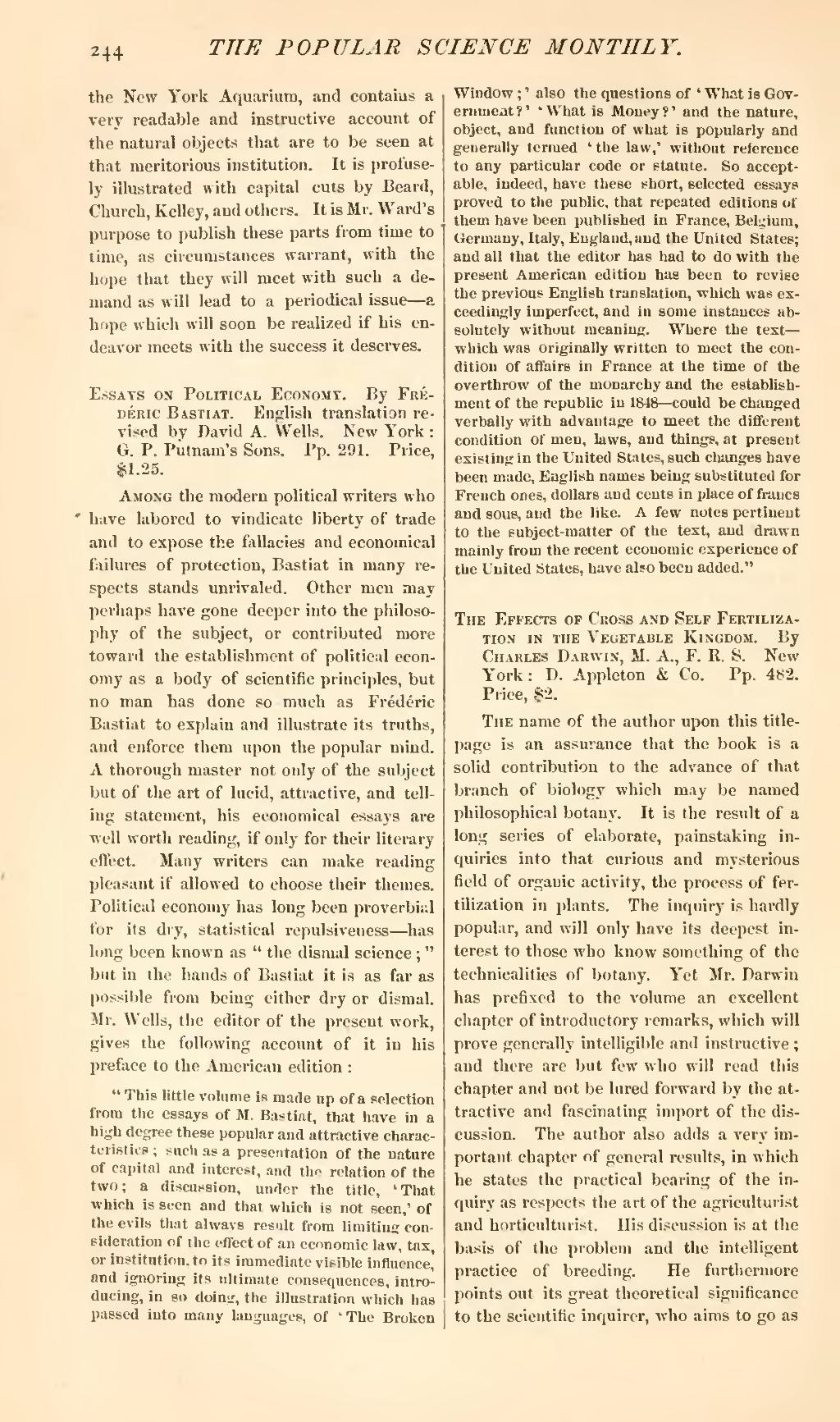the New York Aquarium, and contains a very readable and instructive account of the natural objects that are to be seen at that meritorious institution. It is profusely illustrated with capital cuts by Beard, Church, Kelley, and others. It is Mr. Ward's purpose to publish these parts from time to time, as circumstances warrant, with the hope that they will meet with such a demand as will lead to a periodical issue—a hope which will soon be realized if his endeavor meets with the success it deserves.
Essays on Political Economy. By Frédéric Bastiat. English translation revised by David A. Wells. New York: G. P. Putnam's Sons. Pp. 291. Price, $1.25.
Among the modern political writers who have labored to vindicate liberty of trade and to expose the fallacies and economical failures of protection, Bastiat in many respects stands unrivaled. Other men may perhaps have gone deeper into the philosophy of the subject, or contributed more toward the establishment of political economy as a body of scientific principles, but no man has done so much as Frédéric Bastiat to explain and illustrate its truths, and enforce them upon the popular mind. A thorough master not only of the subject but of the art of lucid, attractive, and telling statement, his economical essays are well worth reading, if only for their literary effect. Many writers can make reading pleasant if allowed to choose their themes. Political economy has long been proverbial for its dry, statistical repulsiveness—has long been known as "the dismal science;" but in the hands of Bastiat it is as far as possible from being either dry or dismal. Mr. Wells, the editor of the present work, gives the following account of it in his preface to the American edition:
"This little volume is made up of a selection from the essays of M. Bastiat, that have in a high degree these popular and attractive characteristics; such as a presentation of the nature of capital and interest, and the relation of the two; a discussion, under the title, 'That which is seen and that which is not seen,' of the evils that always result from limiting consideration of the effect of an economic law, tax, or institution, to its immediate visible influence, and ignoring its ultimate consequences, introducing, in so doing, the illustration which has passed into many languages, of 'The Broken Window;' also the questions of 'What is Government?' 'What is Money?' and the nature, object, and function of what is popularly and generally termed 'the law,' without reference to any particular code or statute. So acceptable, indeed, have these short, selected essays proved to the public, that repeated editions of them have been published in France, Belgium, Germany, Italy, England, and the United States; and all that the editor has had to do with the present American edition has been to revise the previous English translation, which was exceedingly imperfect, and in some instances absolutely without meaning. Where the text—which was originally written to meet the condition of affairs in France at the time of the overthrow of the monarchy and the establishment of the republic in 1848—could be changed verbally with advantage to meet the different condition of men, laws, and things, at present existing in the United States, such changes have been made, English names being substituted for French ones, dollars and cents in place of francs and sous, and the like. A few notes pertinent to the subject-matter of the text, and drawn mainly from the recent economic experience of the United States, have also been added."
The Effects of Cross and Self Fertilization in the Vegetable Kingdom. By Charles Darwin, M. A., F. R. S. New York: D. Appleton & Co. Pp. 482. Price, $2.
The name of the author upon this title-page is an assurance that the book is a solid contribution to the advance of that branch of biology which may be named philosophical botany. It is the result of a long series of elaborate, painstaking inquiries into that curious and mysterious field of organic activity, the process of fertilization in plants. The inquiry is hardly popular, and will only have its deepest interest to those who know something of the technicalities of botany. Yet Mr. Darwin has prefixed to the volume an excellent chapter of introductory remarks, which will prove generally intelligible and instructive; and there are but few who will read this chapter and not be lured forward by the attractive and fascinating import of the discussion. The author also adds a very important chapter of general results, in which he states the practical bearing of the inquiry as respects the art of the agriculturist and horticulturist. His discussion is at the basis of the problem and the intelligent practice of breeding. He furthermore points out its great theoretical significance to the scientific inquirer, who aims to go as

